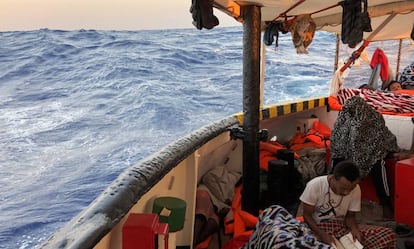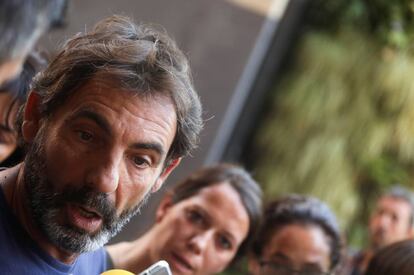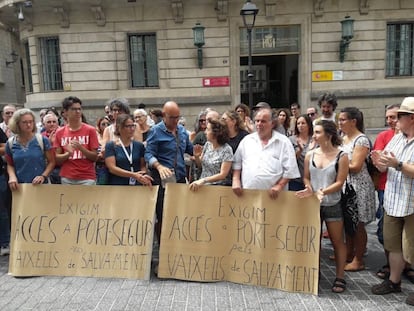Italy’s Salvini refuses entry to ‘Open Arms’ despite EU offer of help
Spain, Portugal, France, Germany, Romania and Luxembourg are willing to welcome some of the 138 people who have been on board a rescue ship for two weeks

Six European countries have offered to take in over 100 migrants who were plucked out of the central Mediterranean by a non-profit rescue group two weeks ago, but whose ship has yet to be offered port entry by any EU member state.
The Open Arms, which is operated by a Spanish aid organization, had been expected to dock in Italy on Thursday evening after Italy's prime minister, Giuseppe Conte, announced the offer of assistance. But Conte has come up against his own interior minister, Matteo Salvini of the right-wing League, who continues to refuse the ship entry.
On Thursday evening, nine more migrants were evacuated from the ship – five who are in ill health and four relatives. This leaves 138 still on board a vessel that was not built to hold so many people for such a prolonged period of time. Last week US actor Richard Gere showed up to deliver food and water after learning of their plight.

The European offer of help, which was revealed by Conte in an open letter on Facebook, comes after the European Commission contacted several countries informally in a bid to find a negotiated solution to the latest migrant crisis to affect the continent. The letter criticized Salvini for his hard-line position on immigration.
Spain will be part of this group of six countries, as well as Portugal, France, Germany, Romania and Luxembourg. Government sources said that EU officials are in talks with more member states to see whether they are willing to take in some of the migrants.
Spain changes tack
Until now, the Spanish government had resisted taking in any of these migrants on the basis that Spain is already under migratory pressure from Morocco, a departure point for many people trying to reach Europe.
But the deteriorating conditions on board the ship, and the fact that it is operated by a Spanish non-profit group, Proactiva Open Arms, have weighed on the decision to take in some of the 147 individuals who remain on the ship. Around 16 have already been evacuated to Italy for medical reasons. The migrants were rescued at sea after attempting the dangerous crossing from Libya.
The executive of acting Spanish prime minister Pedro Sánchez, of the Socialist Party (PSOE), has agreed to participate in a migrant distribution scheme that is being informally coordinated by the European Commission.

Although the Sánchez administration originally adopted an open-port attitude, unilaterally taking in hundreds of rescued migrants who had been rejected by Italy, this policy has changed in the last year. Interior Minister Fernando Grande-Marlaska has complained repeatedly in Brussels that migrants arriving through the central Mediterranean route cannot not be distributed across the EU while Spain is expected to unilaterally deal with all the arrivals through the western route.
The government’s newest position has been influenced by worsening conditions aboard the Open Arms and by domestic pressure – there has been a deluge of offers of help by Spanish regional and municipal authorities, and petitions asking Sánchez for a solution.
One of the last times that Spain found itself in a similar situation was in December 2018, when a dozen migrants were rescued by a Spanish fishing vessel called Nuestra Madre Loreto. Spanish authorities first instructed the captain to take the migrants back to Libya, but the ship finally docked in Malta under a pledge that Spain would take them in.
Just a few days after that, the Open Arms sailed into the Spanish port of Algeciras with 300 rescued migrants, and there was no distribution among EU countries. Since then, Madrid had refused to take charge of any more migrants rescued on the “Italian” route.
English version by Susana Urra.
Tu suscripción se está usando en otro dispositivo
¿Quieres añadir otro usuario a tu suscripción?
Si continúas leyendo en este dispositivo, no se podrá leer en el otro.
FlechaTu suscripción se está usando en otro dispositivo y solo puedes acceder a EL PAÍS desde un dispositivo a la vez.
Si quieres compartir tu cuenta, cambia tu suscripción a la modalidad Premium, así podrás añadir otro usuario. Cada uno accederá con su propia cuenta de email, lo que os permitirá personalizar vuestra experiencia en EL PAÍS.
¿Tienes una suscripción de empresa? Accede aquí para contratar más cuentas.
En el caso de no saber quién está usando tu cuenta, te recomendamos cambiar tu contraseña aquí.
Si decides continuar compartiendo tu cuenta, este mensaje se mostrará en tu dispositivo y en el de la otra persona que está usando tu cuenta de forma indefinida, afectando a tu experiencia de lectura. Puedes consultar aquí los términos y condiciones de la suscripción digital.








































